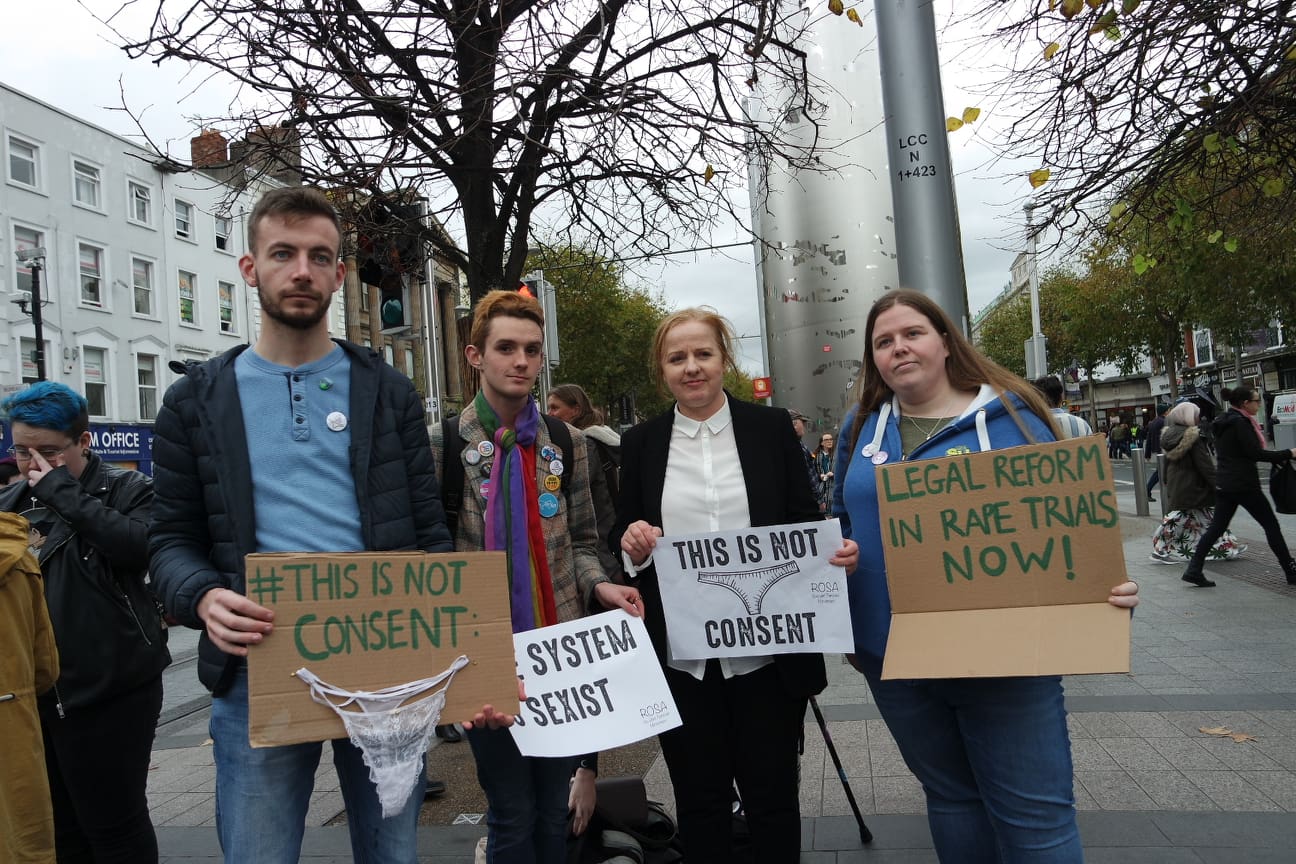The Union of Students in Ireland (USI) is supporting rallies against victim blaming of sexual assault survivors taking place across Ireland today. The rallies are in response to a recent Cork rape trial which saw defence barrister Elizabeth O’Connell argue a girl, 17, was open to “being with someone” because of her choice of underwear.
Women’s rights group ROSA are leading today’s rallies, stating: “These lines of character accusation and victim blaming are unfortunately a common tactic used in cases before the courts relating to sexual violence”. USI Vice-President for the Irish Language, Aoife Deasy, addressed the Dublin rally on O’Connell Street this afternoon.
Speaking to Trinity News, Trinity College Dublin Students’ Union (TCDSU) Gender Equality Officer Aoife Grimes outlined that “the horrible events in Cork are really telling of the fact that so much more work still needs to be done”.
Grimes stated that there is “not enough dignity and respect” shown in College policies regarding sexual assault. “It is not anybody in particular’s fault, it’s just in Ireland there is no culture of appreciation of these things,” continued Grimes.
The trial saw the Central Criminal Court jury unanimously conclude that the 27-year-old male defendant was not guilty of raping the 17-year-old girl in an alleyway in Cork. The jury, comprised of eight men and four women, was told by the defence barrister to take into account the type of underwear the complainant was wearing on the night: “You have to look at the way she was dressed. She was wearing a thong with a lace front.”
Ruth Coppinger T.D. addressed the Dublin gathering this afternoon. Speaking to Trinity News at the rally, Coppinger stated: “Primarily what we’re focusing on is: can we build up towards a huge strike on international women’s day next year?” Coppinger noted that students are in a “very strong position” to protest because of the ability to “organize together”.
On Tuesday, Coppinger displayed a thong in the Dáil in a call on the government to “make massive legal changes” to end the “routine victim blaming going on in Irish courts” in sexual assault cases.
Coppinger noted that women have been continuously discredited in such trials, drawing on cases where fake tan and even contraception were used against them in court.
Trinity students protested the not guilty verdict in the high-profile Belfast rape trial earlier this year which saw Ulster rugby players Paddy Jackson and Stuart Olding, and Blane McIlroy and Rory Harrison stand trial. The verdict saw Trinity students take to the streets alongside protesters with chants of “I Believe Her”.
Sexual assaults on students appear to increase annually around September and October as the academic year begins, with rape crisis centres in Dublin, Cork, and Galway seeing an influx of reports this autumn. Speaking to Trinity News, Director of the Dublin Rape Crisis Centre (DRCC) Noeline Blackwell confirmed that DRCC received reports of rape and other sexual assaults from students newly enrolled at college.
“Unfortunately, this is not a new trend,” said Blackwell. “Each year, around the start of the academic year, we will get some disclosures from very upset students.”
A recent study by the Rape Crisis Network estimates that, at most, 10% of rapes are reported, and that only 1 in 40 rapists are appropriately punished.
In 2015, Trinity College Dublin Students’ Union (TCDSU) conducted an online survey which revealed that 1 in 4 female students at Trinity had been sexually assaulted. A study released by the National University of Ireland, Galway (NUIG) this summer on consent workshops in third level education indicated that 70% of women have experienced sexual hostility or crude gender harassment by their third year of college.






